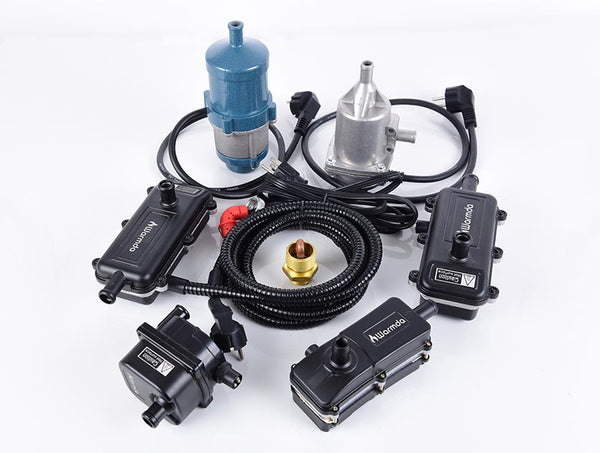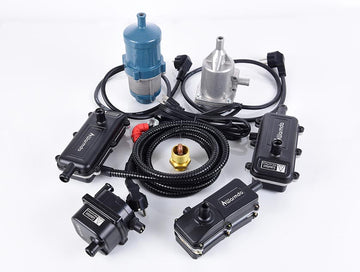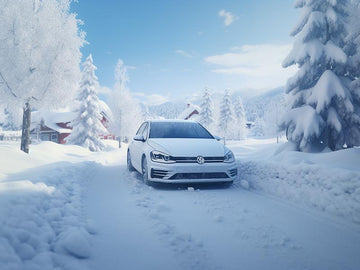How to Choose the Best Engine Heater
Mar 18, 2024
Introduction
Picture this: a cold winter morning, stepping out of the warm confines of your home, ready to drive off to work. But your car seems less prepared to greet the day. Turning the key only yields a reluctant grumble from the engine, as if complaining about the cold weather. This scenario is a daily reality for many in cold regions. Fortunately, with the right tools, this ordeal can become much less painful.
You might have guessed it; today, we're talking about engine heaters—your car's cold start assistants in chilly climates. Whether you're an automobile manufacturer, a car modification shop owner, or just a regular car user, knowing the types of engine heaters available on the market and their benefits is crucial for selecting the one that best fits your needs. After all, no one enjoys struggling with their car on a cold morning, right?
Let's dive deeper into the world of engine heaters, helping you choose the perfect starting companion for your car this winter.
Overview of Engine Heaters
Difficulty starting your car on a cold winter morning isn't just because your vehicle "doesn't feel like" working. Low temperatures can cause engine parts to contract, increasing the clearance between them. The cold also thickens engine oil, requiring more energy to start the engine and increasing wear and tear. This is why engine heaters are particularly important for starting cars in cold environments.
Let's explore how engine heaters work and why they are an indispensable companion for your vehicle during winter.
Energy Saving
You might not realize that cold starts require the engine to consume more fuel to reach its normal working state. Engine heaters preheat the engine, helping it reach optimal working temperature more quickly, thus reducing fuel consumption. This is beneficial not only for your wallet but also for the environment.
Reduced Wear
In cold conditions, the increased viscosity of oil significantly adds to engine wear during startup. Preheating the coolant with an engine heater ensures better fluidity of the engine oil at startup, reducing wear on engine parts.
Lower Emissions
Engines produce more emissions before reaching their optimal working temperature. By using an engine heater, you can accelerate this process, thereby reducing harmful emissions during startup. This helps protect the environment and makes it easier for your car to pass emissions tests.

These points illustrate that engine heaters not only make your mornings easier but also contribute to more efficient and environmentally friendly vehicle operation. Next, we will explore the various types of engine heaters available on the market to help you find the one that best suits your needs.
Types of Engine Heaters on the Market
After understanding the benefits of engine heaters, you might wonder about the types available to help your vehicle start smoothly in cold winters. Let's examine these different types of engine heaters, their features, and how to choose the right one based on your specific needs.
Built-in Water Pump Engine Heaters
These heaters not only warm up the engine's coolant but also have an internal water pump to circulate the coolant inside the engine, ensuring even temperature distribution. This is particularly important for vehicles used in extremely cold environments.
Block Heaters
Block heaters are directly installed into the engine block, heating important engine components directly to minimize wear during the startup process. They are especially suitable for applications requiring precise control of engine temperature.
Tank Engine Block Heaters
Tank engine block heaters are external heating devices that warm up the coolant before circulating it back into the engine to preheat it. They are relatively easy to install and suitable for a wide range of vehicle types.
Diesel Engine Heaters
Designed specifically for diesel engines, these heaters use diesel as a power source to improve engine starting performance in cold weather.
Gasoline Engine Heaters
Similar to diesel heaters, gasoline engine heaters are designed to enhance the starting ability of gasoline vehicles in low temperatures by preheating the engine.
Magnetic Engine Heaters
Magnetic heaters attach to the bottom of the engine's oil pan or other ferrous material parts and heat the engine's ferrous components through eddy currents generated by alternating current. They are easy to install and remove, and the heating time is short.
Silicone Oil Pan Heating Pads
These heating pads are attached directly to the oil pan, heating the engine oil to improve lubrication during cold starts. They are easy to install and very effective at protecting the engine during cold starts.
Heating Blankets
Heating blankets can be wrapped around the engine or other vehicle parts to provide a warm environment and facilitate smooth starting. This method is simple and effective, especially for temporary heating when parked.
Dipstick Heaters
These heaters are inserted into the dipstick tube to heat the engine oil, thereby improving cold start performance. They are convenient to install and provide immediate protection for the engine.
Understanding these different types of engine heaters should now give you a clearer idea of which type is most suitable for your needs. Each heater has its unique advantages, and it's important to choose one that matches your vehicle type, usage habits, and budget. Next, we will discuss how to select the most appropriate engine heater based on your specific needs.
In-depth Comparison of Various Heaters
When looking for the perfect engine heater, understanding the working principle, pros and cons, and most suitable scenarios of each type is crucial. This not only helps you make a more informed decision but also ensures that your investment meets your needs as effectively as possible. Let's delve into the various heaters, with a special focus on the unique advantages of built-in water pump engine heaters.
Built-in Water Pump Engine Heaters
Working Principle: Installed in the engine's cooling system and powered by 110V or 230V, these heaters use a heating element to warm the coolant. An internal water pump circulates the heated coolant, quickly entering the vehicle's engine. This heater evenly distributes heat throughout the engine, with the built-in water pump ensuring effective circulation, shortening heating time, improving heat utilization, and reducing energy consumption.
Advantages: The internal thermostat prevents overheating, and uniform heating helps the engine reach working temperature faster, reducing wear and improving efficiency. They are easy to install and cost-effective.
Disadvantages: Requires access to a domestic power supply. If air is present inside, the water pump may not operate correctly.
Most Suitable Scenarios: Ideal for cold regions, especially for vehicles that need frequent starts or are exposed to low temperatures for extended periods, and for generator sets.
Block Heaters
Working Principle: Directly installed in the engine block, providing direct heating through electrical heating elements.
Advantages: High heating efficiency, acting directly on important engine components to quickly increase temperature.
Disadvantages: Uses a domestic power supply and requires a more professional installation, involving the disassembly of some engine parts.
Most Suitable Scenarios: Vehicles that can conveniently use a power supply and can be continuously plugged in, such as emergency service vehicles or regular driving in cold regions.
Tank Engine Block Heaters
Working Principle: The heating element is housed within a tank installed in the vehicle's cooling system, heating the coolant before circulating it back into the engine through thermal cycling.
Advantages: Allows for preheating the cooling system without starting the engine, helping reduce wear during the initial start.
Disadvantages: Uses a domestic power supply and is more complex to install, needing to be placed at the engine's lowest point and ensuring no air is inside the heater.
Most Suitable Scenarios: Vehicles with sufficient installation space, especially large vehicles, construction machinery, and generator sets.
Diesel Engine Heaters / Gasoline Engine Heaters
Working Principle: Designed for different fuel types, powered by 12V or 24V to drive the heater's electrical parts, heating the coolant by burning fuel, directly increasing engine temperature to improve cold start performance.
Advantages: Does not require a domestic power supply, very convenient to use. Tailored solutions effectively address engine startup issues in low temperatures.
Disadvantages: Relatively expensive, complex installation requiring professional knowledge.
Most Suitable Scenarios: Vehicles that cannot conveniently use a domestic power supply, specific fuel type vehicles, especially in extremely cold environments.

Magnetic Engine Heaters
Working Principle: Generates heat through magnetism, can be installed on the oil pan or other ferrous parts.
Advantages: Easy to install, wide applicability.
Disadvantages: Uses a domestic power supply, heating may not be as uniform or quick as direct heating methods.
Most Suitable Scenarios: Users needing a simple, portable heating solution.
Silicone Oil Pan Heating Pads
Working Principle: Attached under the engine oil pan, heating the oil pan through electrical heating elements to quickly warm the oil.
Advantages: Easy to install, relatively low cost.
Disadvantages: Uses a domestic power supply, limited heating range, mainly targets oil.
Most Suitable Scenarios: Budget-sensitive users mainly needing to improve oil flow.
Heating Blankets and Dipstick Heaters
Working Principle: Provide direct or indirect heating through external covering or insertion of heating elements.
Advantages: Powered by 12V or 24V, easy to install and use, high flexibility.
Disadvantages: Heating efficiency and range may be limited.
Most Suitable Scenarios: Users needing a portable or temporary heating solution.

By comparing these different types of heaters, you should now have a clearer understanding of which one better suits your needs. Especially, built-in water pump engine heaters, with their uniform heating effect and long-term protection for the engine, become the preferred choice for many users in cold regions. However, the final selection should be based on your specific needs, vehicle type, and budget.
How to Choose the Right Engine Heater for You
Choosing the right engine heater might seem daunting, especially considering the plethora of options available on the market. However, by understanding a few key factors and following a simple decision-making framework, you can easily find the heater that best fits your vehicle and needs.
Considerations
Before making a purchase, several important factors need to be considered:
- Vehicle Type: Different engine heaters are suitable for different types of cars and engines. For example, diesel engine heaters are specifically designed for diesel vehicles, while block heaters may be more suitable for vehicles with specific space configurations. Built-in water pump engine heaters are suitable for all engines using coolant.
- Power Source: Whether the location where you park allows for easy access to a domestic power source. If your vehicle often stays outdoors overnight, diesel engine heaters or gasoline engine heaters might be a better choice.
- Usage Environment: Your geographic location and climate conditions greatly influence heater selection. Extremely cold regions may require higher-performance heaters, such as models with built-in water pumps, to ensure the engine can start smoothly under any conditions.
- Budget: The price range for engine heaters can vary from relatively inexpensive heating pads to more expensive built-in water pump heaters and diesel or gasoline engine heaters. Determining how much you're willing to spend can help narrow down your options.
Recommended Strategy
Based on the above factors, here is a simple decision-making framework to help you choose the most suitable engine heater:
- Identify Vehicle and Engine Type: First, confirm whether your car has a water-cooled or air-cooled engine and any specific configuration requirements. This will help you eliminate some options that are not suitable.
- Evaluate Power Source Use: Confirm whether you can conveniently use a domestic power source where you often park. If not, consider choosing diesel or gasoline engine heaters.
- Assess Usage Environment: Consider the average winter temperatures in your area and the lowest temperatures you might face. If you live in an extremely cold region, consider choosing a more powerful heater, such as one with a built-in water pump or diesel and gasoline engine heaters.
- Set a Budget: Look at the available options within your budget. If funds are limited, you may need to consider solutions with a higher cost-benefit ratio, such as silicone oil pan heating pads or tank heaters.
- Consider Installation and Maintenance: Diesel and gasoline engine heaters require professional installation, while other types are relatively easy to install. Considering long-term maintenance and potential repair costs is also important.

By following this framework, you can make a choice with greater confidence, ensuring you select an engine heater that meets both your needs and budget for the cold winter months. Remember, the most important aspect is ensuring your vehicle can start reliably in any weather condition, reducing wear and extending engine life.
Special Recommendation: Vvkb Engine Heaters
In the search for the best engine heater, Vvkb engine heaters stand out for their exceptional performance and user-friendly design. Whether you're facing extreme cold weather or simply want to provide the best starting conditions for your beloved vehicle, Vvkb engine heaters meet your needs.
Product Highlights
- Experienced: With over 28 years of production experience, Vvkb engine heaters can meet any need with their ample technical reserves, catering to your special customizations.
- Technological Advancement: Vvkb engine heaters employ the latest heating technology to quickly and evenly heat your engine, reducing wear during cold starts. Their unique design ensures maximum heating effect while maintaining efficient energy use.
- Efficiency: Vvkb engine heaters stand out for their faster heating times and higher thermal efficiency compared to other heaters. This means you can start your vehicle quicker while reducing energy consumption.
- Ease of Installation and Use: Vvkb is committed to making its products easy to install and use for every user. Whether you're a DIY novice or an experienced mechanic, the installation process for Vvkb engine heaters is straightforward and simple, and their detailed instructions and online support ensure you can easily complete the installation.
- Customer Service: Should you encounter any issues during the use of the heater, simply email Vvkb's service team, and you will receive a response within 8 hours.
Customer Testimonials
Users from various backgrounds have shared their positive experiences with Vvkb engine heaters, further proving their superior performance.
- John, a truck driver from Alaska: "Here, the temperature can get very low in winter, and I used to worry about starting my truck in the morning. Since installing the Vvkb engine heater, I no longer have this problem. It's extremely reliable and efficient."
- Amy, a homemaker from Minnesota: "I don't know much about cars, but I was able to install the heater myself following Vvkb's guide. Now, no matter how cold it is outside, my car starts on the first try, bringing great convenience to my family."
- Mark, a mechanic from Colorado: "As a professional, I've seen and installed various engine heaters. The quality and efficiency of Vvkb's products are top-notch. I now recommend it to all clients seeking engine heating solutions."
These real-user reviews and stories highlight Vvkb engine heaters' reliability and efficiency in various usage scenarios. Whatever your needs, Vvkb offers a robust solution to ensure your vehicle starts easily in winter.
Conclusion
Choosing the right engine heater is crucial for those living in cold regions. It's not just about the convenience of starting your car in the morning but also about long-term engine health, fuel efficiency, and reducing environmental impact. A wise selection means considering your vehicle type, usage environment, and budget to ensure you get the most suitable product.
If you're interested in Vvkb engine heaters or any other type of heater, we encourage you to explore further and make an informed choice. Visit the official website or consult our buying guide for more information. Here, you'll find detailed introductions to different heater models, including installation guides, user reviews, and purchase options.
Wherever you are, whatever winter challenges your vehicle faces, remember: the right engine heater can make every cold morning start a breeze. Choosing the appropriate engine heater not only makes your vehicle start easily on chilly mornings but also ensures the long-term health and performance of your engine. So, don't wait for a freezing morning to regret not being prepared—act now!
In the cold season, let's ensure our beloved vehicles are always ready to greet every beautiful winter morning.










